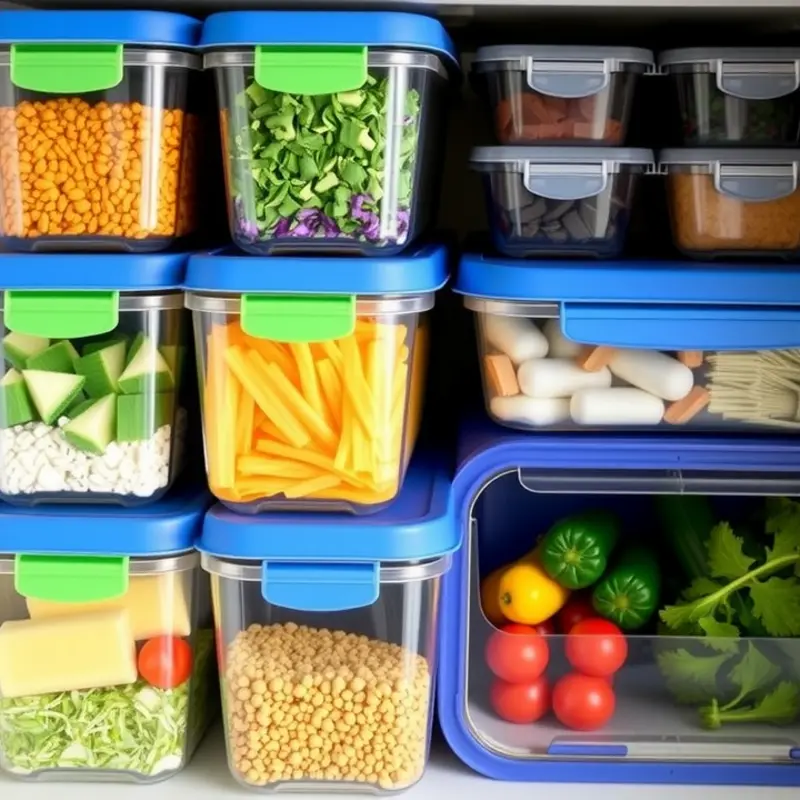Navigating the hectic routines of today’s world makes mealtime a challenge for many families. Efficient meal planning and prepping can alleviate stress while ensuring that everyone enjoys nutritious and delicious meals. Embracing a streamlined approach not only saves time but also enhances the family dining experience, making it enjoyable rather than burdensome. Let’s dive into some effective strategies that can transform your meal routines.
Strategic Meal Planning: Setting the Foundation

Creating a meal planning routine that aligns with your lifestyle is essential for simplifying family meals. A successful meal plan acts as a blueprint, guiding you through your weekly dining experience with ease and satisfaction.
Start by assessing your family’s dietary needs. Are there any allergies, specific dietary preferences, or nutritional requirements to consider? Gather this information to ensure your meal plan is inclusive and tailored.
Next, evaluate your schedule. Identify the days you have more time to cook and those when convenience is key. Consider batching tasks for efficiency. For example, reserve Sundays for meal prep, when you can prepare ingredients to streamline cooking during the week.
Develop a meal rotation schedule based on your family’s preferences. Begin with a list of favorite meals and incorporate a mix of familiar dishes with occasional new recipes. Rotating meals prevents monotony and keeps everyone engaged.
Leverage your pantry and freezer. Maintain a stock of versatile staples like rice, pasta, canned tomatoes, and frozen vegetables. These ingredients serve as foundations for numerous dishes, allowing flexibility. Explore practical ingredient batching to optimize your ingredient use throughout the week.
Consider the nutritional balance of each meal. Include protein, carbohydrates, and healthy fats in every dish. Use vibrant vegetables to add color and nutrients. Balancing these elements keeps meals well-rounded and satisfying. Check for opportunities to incorporate seasonal produce, which tends to be fresher and more affordable.
Utilize digital tools or traditional planners for organization. Meal planning apps or simple spreadsheets can help visualize your plan. These tools often feature reminders for grocery shopping or upcoming meal prep tasks, enhancing your planning efficiency.
Flexibility is crucial. Leave space in your plan for one or two ‘open’ meals each week. These can accommodate unexpected events, like dining out or creating a meal from leftovers. This approach minimizes waste and stress.
Lastly, involve family members in the planning process. Gather input on preferred meals or invite them to assist with meal prep. Engaging children or partners fosters a sense of responsibility and can turn meal preparation into quality family time.
By laying this strategic foundation, family meals become not only manageable but enjoyable, allowing you to focus on what truly matters—shared moments around the dining table.
Effortless Meal Prep: Making the Most of Your Kitchen Time

Effortless meal prep starts with smart planning and strategic use of your kitchen time. By dedicating a few hours each week to preparing meals in advance, you can significantly reduce stress and save time on busy days.
Batch Cooking Shortcuts
Batch cooking is a powerful approach for efficient meal prep. It involves cooking large quantities of food at once, which you can then use throughout the week. Start by choosing a versatile base ingredient, such as rice, quinoa, or beans. Cook a large batch, and then use them in various dishes: curries, stir-fries, or salads. Focus on recipes that allow you to change flavors easily through different sauces and seasonings. This method not only saves time but also helps in reducing food waste. You can explore more about practical ingredient batching in this guide.
Storage Tips for Longevity
Proper storage is crucial to maintaining the freshness and quality of your meal preps. Use airtight containers to keep your meals fresh longer and prevent odors from mixing. For meals with both wet and dry components, store each separately to maintain texture. Label your containers with the date of preparation and a brief description. This way, you can easily identify and manage your meals throughout the week, ensuring you’re consuming them within safe timeframes.
Freezing your meals is also a great option, especially for those who enjoy cooking in bigger batches. When you freeze your meals, portion them individually. This not only speeds up reheating but also minimizes food waste by allowing you to thaw exactly what you need.
Simple Recipes for Easy Prep
When selecting recipes, opt for those with minimal ingredients and steps. One-pot dishes, sheet pan meals, and slow-cooker recipes are excellent choices for simplicity and minimal cleanup. Here’s a quick example: A sheet pan meal combining chicken, your favorite vegetables, and a simple seasoning mix can serve as dinner one evening and a wrap filling for lunch the next day.
For breakfast, prepare overnight oats or a frittata loaded with vegetables. Both can be stored in the refrigerator and conveniently consumed on rushed mornings. For snacks, consider energy bites made with oats, nuts, and honey—they require no cooking, just a quick mix and roll.
Include opportunities for customization within each meal. A taco bar with pre-chopped toppings, pre-cooked protein, and tortillas allows each family member to craft their preferred taco style. This encourages creativity while using the same core ingredients.
Start incorporating these effortless meal prep techniques into your routine, and you’ll find that mealtime becomes less of a burden and more of an enjoyable experience. By making the most of your kitchen time, you not only nourish your family with home-cooked meals but also reclaim valuable moments for yourself each week.
Final words
By adopting meal streamlining techniques, families can ease the burdens of cooking and dining while enhancing both nutrition and enjoyment. Strategic meal planning lays a solid foundation, allowing everyone to know what to expect during dinner times. Meanwhile, effective meal prep transforms mealtimes into less stressful, more harmonized experiences. With these strategies in mind, you’re well on your way to a simplified, effective mealtime routine that caters to all family members. Embrace the journey, and watch your dining experience flourish!







